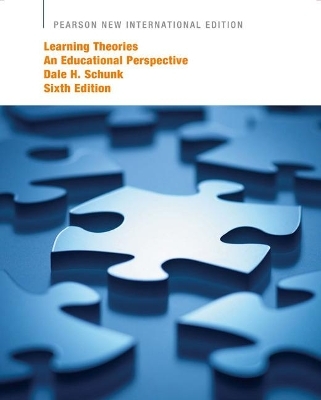
Learning Theories: An Educational Perspective
Pearson Education Limited (Verlag)
978-1-292-02058-7 (ISBN)
Key features of this revised text include: a new chapter on Self-Regulation (Chapter 9); core chapters on the neuroscience of learning (Chapter 2), constructivism (Chapter 6), cognitive learning processes (Chapter 7), motivation (Chapter 8), and development (Chapter 10) all related to teaching and learning; updated sections on learning from technology and electronic media and how these advancements effectively promote learning in students (Chapters 7 & 10); detailed information on content-area learning and models of instruction to form coherence and connection between teaching and learning in different content areas, learning principles, and processes (Chapters 2-10); and over 140 new references on the latest theoretical ideas, research findings, and applications in the field. An essential resource for understanding key learning theoretical principles, concepts, and research findings–especially as they relate to education–this proven text blends theory, research, and applications throughout, providing its readers with a coherent and unified perspective on learning in educational settings.
Dale H. Schunk is Dean of the School of Education and Professor of Curriculum and Instruction at the University of North Carolina at Greensboro. He holds a Ph.D. in Educational Psychology from Stanford University, a M.Ed. from Boston University, and a B.S. from the University of Illinois at Urbana. He has held faculty positions at Purdue University (where he served as Head of the Department of Educational Studies), the University of North Carolina at Chapel Hill (where he also was Chair of the Academic Affairs Institutional Review Board), and the University of Houston. Dale has edited six books, is co-author of Motivation in Education: Theory, Research, and Applications (Prentice Hall, 2008) and has authored over 80 articles and book chapters. He has served as President of Division 15-Educational Psychology for the American Psychological Association and as Secretary of Division C-Learning and Instruction for the American Educational Research Association. He is presently a member of the editorial boards of three professional journals. Dale's teaching and research interests include learning, motivation, and self-regulation. He has received the Early Career Contributions Award in Educational Psychology from the American Psychological Association, the Albert J. Harris Research Award from the International Reading Association, and the Outstanding Service Award from the Purdue University School of Education
Table of Contents
Chapter 1 — Introduction to the Study of Learning
Learning Defined
Precursors of Modern Learning Theories
Learning theory and philosophy
Beginnings of the psychological study of learning
Structuralism and functionalism
Learning Theory and Research
Functions of theory
Conducting research
Assessment of Learning
Direct observations
Written responses
Oral responses
Ratings by others
Self-reports
Relation of Learning and Instruction
Historical perspective
Instructional commonalities
Integration of theory and practice
Critical Issues for Learning Theories
How does learning occur?
What is the role of memory?
What is the role of motivation?
How does transfer occur?
Which processes are involved in self-regulation?
What are the implications for instruction?
Three Learning Scenarios
Kathy Stone’s third-grade class
Jim Marshall’s U. S. History class
Gina Brown’s educational psychology class
Summary
Further Reading
Chapter 2 — Behaviorism
Connectionism
Trial-and-error learning
Laws of exercise and effect
Other principles
Revisions to Thorndike’s theory
Instructional applications
Classical Conditioning
Basic processes
Informational variables
Biological influences
Conditioned emotional reactions
Contiguous Conditioning
Acts and movements
Associative strength
Rewards and punishments
Habit formation and change
Operant Conditioning
Conceptual framework
Basic processes
Behavioral change
Behavior modification
Self-regulation
Instructional Applications
Behavioral objectives
Learning time
Mastery learning
Programmed instruction
Contingency contracts
Summary
Further Reading
Chapter 3 — Neuroscience of Learning
Organization and Structures
Neural organization
Brain structures
Localization and interconnections
Brain research methods
Neurophysiology of Learning
Information processing system
Memory networks
Language learning
Brain Development
Influential factors
Phases of development
Critical periods
Language development
Motivation and Emotions
Motivation
Emotions
Instructional Applications
Relevance of brain research
Educational issues
Brain-based educational practices
Summary
Further Reading
Chapter 4 — Information Processing Theory
Information Processing System
Assumptions
Two-store (dual-memory) model
Alternatives to the two-store model
Attention
Theories of attention
Attention and learning
Attention and reading
Perception
Gestalt theory
Sensory registers
LTM compar
| Erscheint lt. Verlag | 2.8.2013 |
|---|---|
| Verlagsort | Harlow |
| Sprache | englisch |
| Maße | 214 x 276 mm |
| Gewicht | 1196 g |
| Themenwelt | Geisteswissenschaften ► Psychologie ► Allgemeine Psychologie |
| Geisteswissenschaften ► Psychologie ► Pädagogische Psychologie | |
| Geisteswissenschaften ► Psychologie ► Verhaltenstherapie | |
| ISBN-10 | 1-292-02058-X / 129202058X |
| ISBN-13 | 978-1-292-02058-7 / 9781292020587 |
| Zustand | Neuware |
| Haben Sie eine Frage zum Produkt? |
aus dem Bereich


